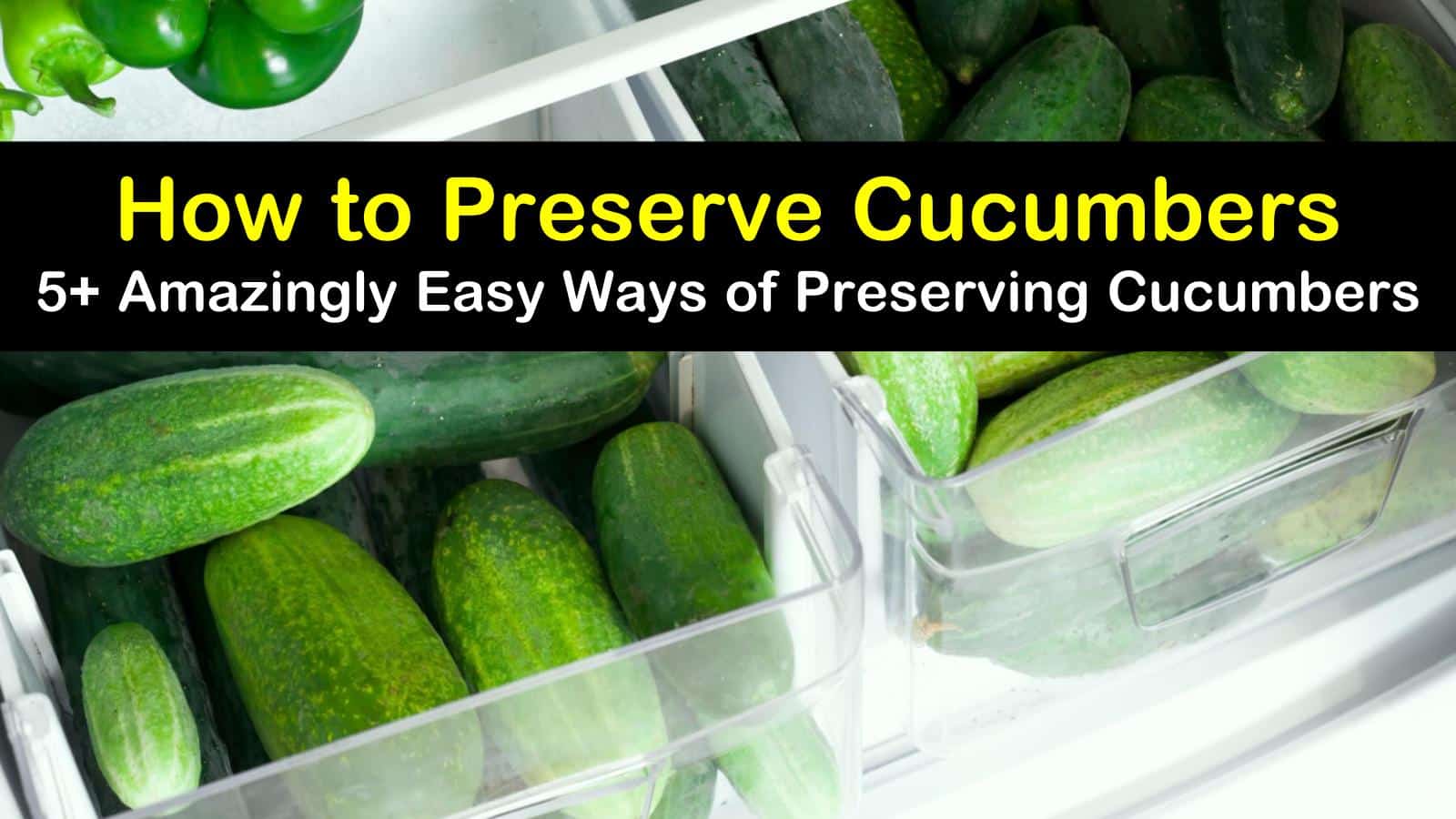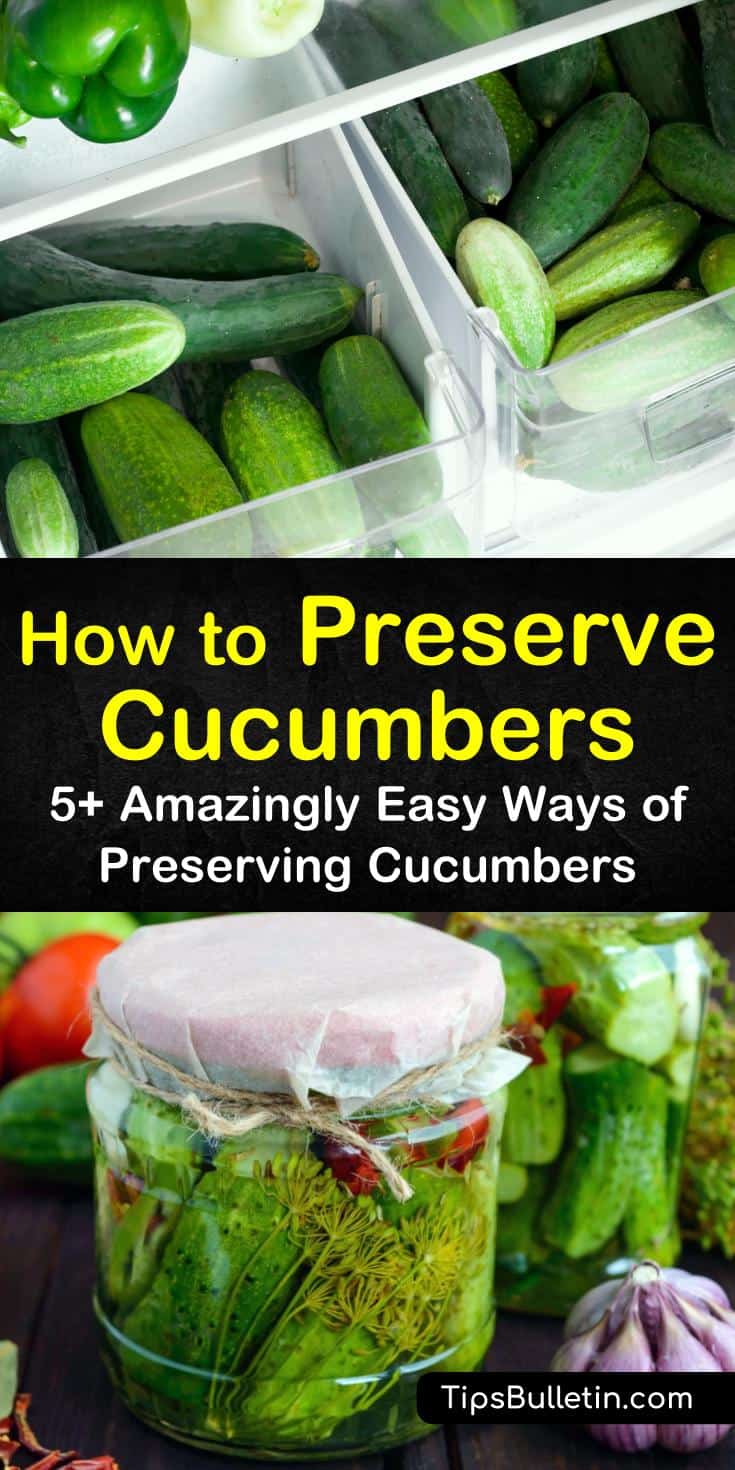Cucumbers are delicious veggies that are wonderful to keep on hand in your kitchen. Not only are they incredible when used fresh in salads or smoothies, but they also come in many different flavors and varieties when pickled as well. One way to keep these yummy foods in your home year-round is to learn how to preserve cucumbers in the first place.
Preserving a cucumber is an essential skill that most gardeners and anyone who practices homesteading. You want to be able to get the most out of your crop long after the harvest season has passed. Even if you aren’t an avid gardener, these helpful food preservation tips will still come in handy.
If you’ve just scored an enormous deal from your local grocery store or farmers’ market and now have more cucumbers than you can eat in a week, we can help. No matter what your reasons for wanting to know the best way to preserve cucumbers, we’ve got all the information you’ll need for short and long-term storage.

Tips for Preserving a Cucumber the Correct Way
There are many excellent ways to preserve cucumbers, whether by keeping them as fresh or pickled cucumbers. If you do plan on pickling cucumbers, you can always try other flavors as well, such as spicy variations or deliciously sweet pickles. The difference between pickle and cucumber depends on preservation.
Store Cucumbers at Room Temperature
While our first instinct for storing a cucumber is to toss it into the fridge immediately, this isn’t always the best place to store them. Fresh cukes are often susceptible to the cold, making it easy for them to deteriorate more quickly in the fridge.
To keep cucumbers fresh when storing cucumbers outside of the refrigerator, keep them in a cool, dry area, much like how to preserve beets. Any moisture causes the cucumbers to rot even faster, especially when exposed to heat, humidity, or dramatically fluctuating temperatures. Keep your cucumbers away from foods that produce ethylene gas, such as bananas or tomatoes, or they will spoil quickly.
If there aren’t any cool areas in the house to keep your cucumber safe, the fridge is still an acceptable place to store them. Swaddle up that little cucumber bundle of joy with a paper towel first, then place it inside a bag in the crisper drawer. Use within a few days for optimum freshness and flavor.
Preserving a Cucumber in the Fridge
One great way to keep cucumbers fresh is to create refrigerator pickles. Pickles stored in the fridge will stay healthy and safe to eat for up to four months.

While this time may seem short compared to more prolonged preservation options like canning, it’s a wonderful way to extend the shelf life of pickles you plan on eating soon.
The way to pickle cucumbers without using a canner is to start by slicing up your fresh cucumbers into thin discs and placing them in a large bowl with salt and chopped onions. Cover them and allow them to sit in the bowl for at least one hour.
While the cukes are resting with the onions and salt, prepare the brine by combining the remaining ingredients in a large saucepan and bringing it to a boil. Let the mixture boil until you note that all the sugar dissolves completely.
Add the brine to the cucumbers and let them soak for an additional ten minutes to pickle onions and cucumbers. Scoop the cucumber slices, onions, and the brine into glass jars with lids.
A wide-mouth funnel is ideal for this purpose. Seal the jars, then leave them in the fridge for one whole day before sampling. You can also toss other vegetables into the jar for pickling, such as cauliflower, peppers, or carrots. Most veggies respond well to pickling and taste delicious.
How to Preserve Cucumbers in the Freezer
Can you freeze cucumbers to eat later? What about preserving garlic? You sure can store these veggies in the freezer. Freezing cucumbers and other vegetables is another easy way to preserve your veggies for extended lengths of time without going through the hassle of canning them.
For the most part, the process is relatively simple to follow and is better when used with cut up cucumbers rather than whole ones. Start by slicing cucumbers with or without the skin.
On with a cookie sheet lined with parchment paper, lay the cucumber slices out over the top. Place them in the freezer, then leave them there for several hours. Place your frozen cucumbers into a sealable freezer bag.
Label each freezer bag with the date, so you know how long they’ve been in your freezer. Can you freeze cauliflower the same way? Yes, use this same technique to freeze fresh zucchini or squash, or cauliflower, too.
It’s also possible to puree cukes ahead of time in your blender and store them as ice cubes in an ice cube tray. It’s an incredibly simple way to save cucumbers for your next smoothies and saves you a step when you may already be in a time crunch in the morning.
Pop a few cubes into the blender, along with the other drink ingredients, then let the machine work its magic. Either technique will allow you to hold onto your cucumbers anywhere between six months to a year.
Best Way to Preserve Cucumbers Long Term
If you want a long term way to preserve vegetables like cucumbers, then pickling and canning them is an excellent method to use. This strategy allows you to enjoy your cucumbers for up to one year or even longer before you need to say goodbye to them forever.
For this recipe, we chose homemade bread and butter pickles, but use any other variation of pickling recipes you prefer.
Preserving cucumbers in vinegar is the best way to store them when canning and it gives them a nice tangy flavor. Before the canning process, pickle them in the same way you did the refrigerator pickles. Sprinkle the cut cucumbers with salt, let them sit in the fridge for about an hour, prepare the brine, then mix them all.
To can them, you’ll need to use a water bath canner. Fill each Mason jar with enough cucumbers and brine to leave at least one half of an inch of headspace from the top. Place them in the canner once the water starts to boil.
Leave them in hot water for at least five minutes before removing them with a pair of tongs. Once they’ve had time to cool, you can store them for up to two years.
Use Lacto Ferment to Preserve Cucumbers
Another pickling method you can use to keep cucumbers fresh for longer is a Lacto fermentation method that doesn’t use vinegar. The recipe still calls for creating a brine, but instead of using vinegar to preserve the veggie, the process uses lactic acid in a way similar to how you make sauerkraut. This recipe makes about one half gallon of garlic dill pickles.
Start by making your brine out of the water and sea salt. Add cloves, dill, a portion of the spices, and the grape leaves to the bottom of your Mason jars. You can also use black tea leaves in place of grape leaves.
Next, add a short layer of cucumbers, then sprinkle another portion of the seasonings over the top. Finish filling the jar with the cucumbers, and pour the remainder of the spices into the jar.Pour the brine over the cucumbers and fill it until you have about one to two inches of headspace remaining.
Seal them by ensuring the lid is airtight. Store them in a safe area for at least ten days before testing them. Once they’ve reached the level desired taste you want, store them in the fridge for an additional two months before they need to be thrown out.
Preserving Cucumbers without Pickling
If you don’t want to use the pickling method for long-term storage, then drying them may be the option for you. To complete this process, you’ll need a dehydrator or, at the least, your oven.
Similar to the pickling recipes, there are numerous flavor combos you can try. This particular recipe explores mouthwatering ranch cucumbers, which is also a great option to use with veggies like zucchini and radishes.
Start by slicing your cucumbers into skinny slices and tossing them in a bowl with one teaspoon of your preferred cooking oil. Lay the slices down onto the dehydrator, close enough to conserve space, but far apart enough that the slices don’t touch one another.
Sprinkle the mixture, which should be blended entirely ahead of time, over the cucumbers. Leave them in the dehydrator for approximately five hours, checking on them periodically. Once you’ve reached the optimum level of dryness, place them in an airtight container for safekeeping.
To investigate the best way of preserving ginger, you can follow some of the same tips for storing cucumbers. Ginger does quite well in the freezer, by being pickled, or drying. Experiment with the method that works for you and your cooking needs.
By now, you’ve probably found your new favorite way to preserve cucumbers and are eager to make your next batch. With so many yummy flavors and easy preserving tips to choose from, it’s even a little tempting to use them all.
The secret to finding the perfect cucumber preservation method is based on trial and error. Why not give them all a try and see for yourself which way works best for you?

If you found these mouthwatering tips for preserving cucumbers useful, please remember to share how to preserve cucumbers with everyone you know on Facebook and Pinterest.